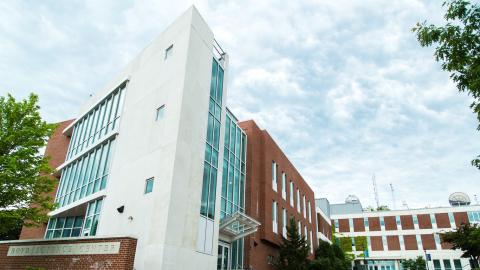Explore the science of life
The Department of Biological Sciences offers opportunities for research and study using the latest technology and equipment, in the lab or in the field. In far-away tropical rain forests and deserts, New Hampshire’s own lakes, forests, and seacoast, and in our state-of-the-art laboratories PSU students work hands-on with faculty members to answer some of life’s toughest and most interesting questions.
Degrees
Plymouth State University offers four paths for students interested in a degree in Biology. What sets apart the Plymouth State experience is hands-on learning opportunities that will prepare them for future careers in biology or further schooling.
The most common choice is the Bachelor of Science (BS) in Biology. Students with this degree pursue further education and jobs across the breadth of biology including graduate school, health professions, and careers from genetics to ecology. We also offered specialized degrees. The BS in Cell and Molecular Biology specifically prepares student for careers in biotechnology and pharmaceutical industry, as well as preparation for graduate degrees, physician’s assistant, or medical school. The BS in Environmental Biology prepares students for field-based graduate degrees and careers in ecology, environmental sciences, and conservation. The Bachelor of Arts (BA) in Biology offers more space for students to add a second minor or complete a double major and leads to science-related careers such as science writing, scientific illustration, and many more.
Other opportunities to study biology include minors in Biology or Neuroscience and a variety of related areas as well as our Biology Honors Program.
Careers
Recent graduates of our programs work for Dana Farber Cancer Center, New Hampshire Fish and Game, Hubbard Brook Research Forest, and have gone on to graduate school at University of New Hampshire, medical school at Dartmouth, and biotechnology companies such as Lonza, Mascoma, and Boston Analytical. For more information about career paths, see below.
The BS in Biology prepares students for graduate or professional schools including medical, dental, and veterinary schools, and broadly prepares students in cellular, physiological, organismal, ecological and evolutionary biology. Note that some professional/graduate schools require a full year of physics and that students should work closely with their academic advisor to plan their coursework.
Curriculum & Requirements
| Course | Title | Credits |
|---|---|---|
| Major Requirements | ||
| BI 1110 | Biological Science I (TECO) | 4 |
| BI 1120 | Biological Science II | 4 |
| BI 2270 | Integrative Biology (WECO) | 4 |
| BI 3060 | Genetics | 4 |
| BI 3130 | Evolution | 4 |
| BI 3240 | Conservation (DICO,GACO) (Remove INCO,INCP) | 3 |
| BI 4980 | Biology Seminar | 2 |
| CH 1050 | Laboratory Safety | 1 |
| CH 2335 | General Chemistry I (QRCO) | 4 |
| CH 2340 | General Chemistry II | 4 |
| CH 3370 | Organic Chemistry I | 4 |
| CH 3380 | Organic Chemistry II | 4 |
| Lower Level Organismal Electives | ||
| Complete two courses from the following: | 8 | |
BI 2030 | Invertebrate Zoology | |
BI 2040 | Vertebrate Zoology | |
BI 2070 | Botany | |
BI 2110 & BI 2130 | Human Anatomy and Physiology I and Human Anatomy and Physiology Laboratory I | |
BI 2120 & BI 2140 | Human Anatomy and Physiology II and Human Anatomy and Physiology Laboratory II | |
| Upper Level Biology Electives | ||
| Complete 15-16 credits of 3000/4000 level Biology courses not including required courses (BI 3060, BI 3130, BI 3240, and BI 4970/4980). One must be a Writing in the Discipline Connection (WRCO). | 15-16 | |
| Physics | ||
| PH 2110 | College Physics I | 4 |
| or PH 2510 | University Physics I | |
| Mathematics Foundations | ||
| MA 1800 | College Algebra (or equivalent Math Placement Score) 1 | 0-3 |
| MA 2130 | Precalculus (QRCO) | 3-4 |
| or MA 2300 | Statistics I (QRCO) | |
| General Education | ||
| EN 1400 | Composition | 4 |
| IS 1115 | Tackling a Wicked Problem | 4 |
| CTDI | Creative Thought Direction | 3-4 |
| PPDI | Past and Present Direction | 3-4 |
| SSDI | Self and Society Direction | 3-4 |
| Directions (choose from CTDI, PPDI, SSDI) 1 | 4-8 | |
| INCP | 4 | |
| Electives | 15-20 | |
| Total Credits | 120 | |
- 1
Math Placement Score can substitute such that only Precalculus or Statistics is required.
- 2
Directions should total 16 credits because SIDI is waived for BS Biology.
Check all course descriptions for prerequisites before planning course schedule. Course sequence is suggested but not required.
To complete the bachelor’s degree in 4 years, you must successfully complete a minimum of 15 credits each semester or have a plan to make up credits over the course of the 4 years. For example, if you take 14 credits one semester, you need to take 16 credits in another semester. Credits completed must count toward your program requirements (major, option, minor, certificate, general education or free electives).
| Year One | Credits | |
|---|---|---|
| BI 1110 | Biological Science I (TECO) | 4 |
| BI 1120 | Biological Science II | 4 |
| CH 1050 | Laboratory Safety | 1 |
| EN 1400 | Composition | 4 |
| IS 1115 | Tackling a Wicked Problem | 4 |
| Mathematics Foundations Course: | ||
| MA 1800 | College Algebra 1 | 0-3 |
| MA 2130 or MA 2300 |
Precalculus (QRCO) or Statistics I (QRCO) |
3-4 |
| Directions (choose from CTDI, PPDI, SSDI) 2 | 3-4 | |
| Elective | 4 | |
| Credits | 27-32 | |
| Year Two | ||
| BI 2270 | Integrative Biology (WECO) | 4 |
| CH 2335 | General Chemistry I (QRCO) | 4 |
| CH 2340 | General Chemistry II | 4 |
| Complete two Lower Level Elective Courses from the following: | 8 | |
BI 2030 |
Invertebrate Zoology | |
BI 2040 |
Vertebrate Zoology | |
BI 2070 |
Botany | |
BI 2110 & BI 2130 |
Human Anatomy and Physiology I and Human Anatomy and Physiology Laboratory I |
|
BI 2120 & BI 2140 |
Human Anatomy and Physiology II and Human Anatomy and Physiology Laboratory II |
|
| Directions (choose from CTDI, PPDI,SSDI) 2 | 6-8 | |
| Electives | 3-4 | |
| Credits | 29-32 | |
| Year Three | ||
| BI 3060 | Genetics | 4 |
| BI 3240 | Conservation (DICO,GACO) | 3 |
| CH 3370 | Organic Chemistry I | 4 |
| CH 3380 | Organic Chemistry II | 4 |
| BI | 3000/4000 level Biology courses 3 | 3-4 |
| Physics Requirement: | 4 | |
PH 2110 or PH 2510 |
College Physics I or University Physics I |
|
| Directions (choose from CTDI, PPDI, SSDI) 2 | 3-4 | |
| Electives | 5-6 | |
| Credits | 30-33 | |
| Year Four | ||
| BI 3130 | Evolution | 4 |
| BI 4980 | Biology Seminar | 2 |
| BI 3000/4000 level Biology electives 3 | 4 | |
| BI 3000/4000 level Biology WRCO | 4 | |
| BI 3000/4000 level Biology elective 3 | 4 | |
| INCP | Integrated Capstone | 4 |
| Directions (choose from CTDI, PPDI, SSDI) 2 | 0-4 | |
| Electives | 2-8 | |
| Credits | 24-34 | |
| Total Credits | 120 | |
- 1
Math Placement Score can substitute such that only Precalculus or Statistics is required.
- 2
Required to take one each of CTDI, SSDI, and PPDI and then fulfill 16 credits total of Directions courses. SIDI courses are waived and do not count toward Directions course total for Biology majors.
- 3
Excluding Genetics, Conservation, Evolution, and Biology Seminar which are required courses.
- An understanding of the scientific method as the means to increase understanding of the natural world through hypothesis-testing.
- An aptitude for critically reading scientific literature, including primary research journals.
- Proficiency in writing, especially in scientific format.
- An ability to present scientific information orally with emphasis on clear interpretation of scientific data.
- Proficiency in techniques specific to a subdiscipline of biology, including but not limited to laboratory, field, and statistical techniques.
- An understanding of the critical issues facing the environment at local, regional, national, and global scales.
- Biological literacy allowing for the evaluation of new information and emerging issues.
- Readiness for post-graduate experiences in graduate school, professional school, or biology employment
- Research skills such as data collection, laboratory techniques, and working in teams
- Ability to problem-solve and think critically
- Written and verbal communication skills to convey technical and scientific data to both scientific and non-scientific communities
Explore Program Details
Biology Majors can take up to 1-2 Minors, including those below.
While a biology major is based in the interdisciplinary studies of biology, chemistry, physics, and math there are also opportunities to extend your interest to some of the other 40+ minors that are offered at Plymouth State, including those below. It’s a great time to be a biology major at PSU!
- Adventure Education
- Chemistry
- Computing
- Criminal Justice (especially for those interested in becoming a Fish and Game officer)
- Global Health
- Health
- Neuroscience (especially for those considering Medical School)
- Mathematics
- Psychology
- Sustainability
- Women’s Studies
-
Program Coordinator of Biology (BA, BS, & MS), Cell & Molecular Biology, & Environmental Biology
-
Assistant Professor of Plant Biology Director, Plymouth State University Herbarium (PSH)

The heart of scientific research and study at PSU is the Boyd Science Center. The University’s proximity to the lakes, rivers and mountains of New Hampshire gives students access to a unique natural laboratory. Resources at Boyd provide students with a place to explore nature’s questions, generated in the great outdoors or under the microscope.
Resources at Boyd
- Climate-controlled chambers for whole organism research
- Dedicated spaces for student research
- PCR, Rt-PCR, Western blotting, Immunohistochemistry
- Animal behavior lab with advanced video tracking
- BSL-2 Microbiology lab
- Six 300-liter marine aquariums
- Human physiology lab
- Collection of bird specimens
- Dedicated tissue culture facility
- Rooftop greenhouse with computerized temperature controls and separate areas for preparation and growing
- PSH, an herbarium of 20K preserved and mounted specimens
- Hands-on experience from molecules and cells to ecosystems
- Degree programs in Biology (B.A. and B.S.), Cell and Molecular Biology, and Environmental Biology
- State-of-the-art laboratory and research facilities, including a 1,400-liter marine aquarium, fully equipped human physiology lab, BSL-2 microbiology and cell biology labs, herbarium and specimen room, and a rooftop greenhouse
- Opportunities for local, national, and international field studies
- Partnerships with New Hampshire Fish and Game, Hubbard Brook Research Forest, NH-INBRE grant to further studies of human health in New Hampshire, and others
- One-on-one advising sessions with a biology faculty member at least once every semester
- A talented and dedicated faculty
Explore Today.
Realize Tomorrow.












